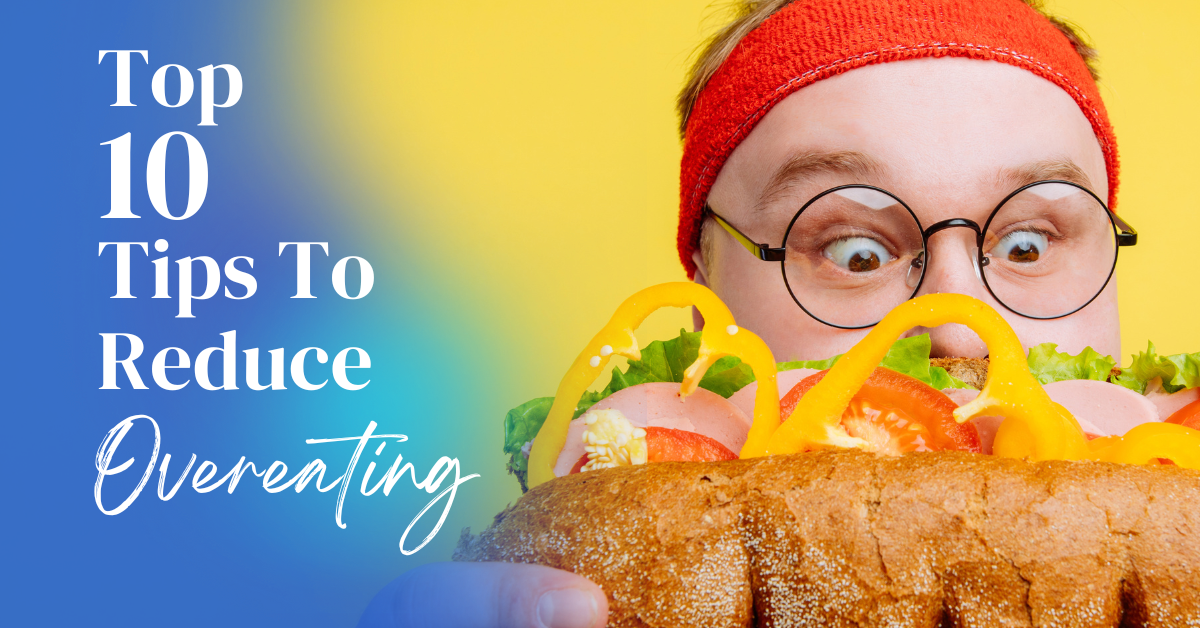You are trying hard to reduce overeating, but oops…you did it AGAIN, (Thanks Brittany). Your mindless overeating left you feeling overly full, stuffed, like your button is going to burst off your pants, or maybe feeling a little sick.
And this isn’t the first time. It’s been a problem for a while. “Why can’t I stop overeating?” most ask themselves, especially when they KNOW it’s happening and they have strong intentions to stop it. But how?
Check out Our Best Tips to Reduce Compulsive Overeating
#1 Ask yourself, am I biologically hungry? When you’re not eating when you are physically hungry, how do you know when to stop eating? Eating when you are experiencing physical yet gentle hunger pangs (and not waiting until you’re ravenous) will ensure you have a better internal gauge to tell you when you’ve had enough – before you get overly full, stuffed, or feeling sick. If you are feeling ravenous before the meal time(s) you tend to find yourself overeating the most, you more than likely are just waiting too long to eat. When you get too ravenous, your primal instincts will kick in and you’ll feel an intense compulsion to eat fast and NOW, often leading to overeating. This is your brain and body’s safety systems to ensure you don’t starve to death. Bad news is, when you’re in this state, mindfulness goes out the window due to the stress response your body slips into.
#2 Eat balanced meals throughout the day. Are you eating enough? That might sound like a weird question if you’re trying to lose weight. Many think, “my problem is I’m eating too much!” and completely disregard this as a possible culprit behind their unwanted overeating. You might be surprised, however, at how many people actually under-eat calorically and nutritionally throughout their first half of the day. If your overeating is primarily happening in the evening and you’re eating nothing but tiny snacks throughout the first half of the day or overall low quality foods, this may be a wonderful area of exploration. Ensuring you have high quality proteins, healthy fat, and yes, carbohydrates throughout the first half of your day could be an absolute game changer to reduce overeating in the evenings.
#3 Watch your diet talk. Deprivation is the number one factor to cravings and overeating. If you’re constantly looking at foods as “good” or “bad” and denying yourself foods or entire food groups in your efforts to “control” your eating and weight, this will backfire on you one hundred percent of the time. Instead, honor your body’s cravings for a variety of foods. Balance is critical. Sometimes you need a bite of something sweet or a cookie here and there. It’s ok (assuming we’re not talking about eating foods you’re highly allergic to!). If you really really really really want something, mindfully have it without judgment, and move on. The less foods you keep on your forbidden foods list due to your power of permission to have them mindfully on occasion, the less they will have power over you in the moment.
#4 Remove distractions. It is easy to get in the habit of multi-tasking, answering emails, seeing what the latest TikTok posts are, or getting lost in your favorite show while eating. Removing distractions that check you out of the experience of taste, smell, aroma, texture, and overall experience of your meal need to be looked at closely. Not getting a full emotional eating experience due to such distractions can cause your brain to not get the “I’ve had enough food” signal and you will naturally continue eating past the amount of food your body needs at that particular meal time. There’s nothing wrong with having music on, reading a book, or other kind of companion during your meal as long as it helps you improve your eating experience and keeps you checked INTO your meal and not checked OUT.

#5 Take three deep breaths before eating. Wow. Do not underestimate this simple tip to help you reduce your overeating. We operate at warp speed all day, it’s no wonder we eat at warp speed too. Speed eating removes our ability to enjoy our meal to the fullest and makes it difficult for our body to signal when we’ve had enough to eat. Taking three deep breaths before any meal or snack will help you calm your body and put on the brakes so you don’t have another Nascar eating experience that leaves you feeling full and regretful.
#6 Enjoy ALL your meals throughout the day. Our past dieting experiences and wanting to eat what we feel we “should” be eating leaves many feeling like their meals are boring and mechanical. Their meals are simply a check in the box for the day. When you are not enjoying your meals, your brain is not receiving the “aaaaaah, that was nice!” eating experience signal. However, your brain doesn’t scream this message, it screams “Hungry!”. Overeating will inevitably take place when you are not enjoying your meals because your brain is worried you have not eaten enough. Enjoy your meals and your overeating will improve.
#7 Increase your water intake. Maybe not the first time you have heard this, but it’s true. Our thirst cues for more water are far more quiet than our cues for more food. If you have trouble with mood, constipation, dry skin, headaches, and observe you really are not going to the bathroom often throughout the day, you may want to explore bumping up your water intake and see how that impacts your overeating at your meal times.
#8 Improve your sleep hygiene. A lack of sleep can throw more than just your hunger and fullness cues off. We could devote an entire blog about the importance of sleep and tips to improve sleep, however for now, consider moving more throughout the day, reducing caffeinated beverages, improve the quality of your overall food intake, eat your last meal more than 2 hours before you go to sleep, or create a nightly ritual to help your mind and body calm down before bedtime as starting points to help you improve your sleep hygiene.

#9 Watch your wondering thoughts. Where are you when you’re eating? Are you thinking about all of your to-do’s? Hyper-focusing on something negative that happened that day, or may happen? It is easy to get lost in our thoughts and therefore lost in our eating experience. Eating itself can be its own form of meditation. When thoughts want to come in and try to interrupt your meal, gently tell yourself that your brain is on a break and you’ll get back to it after the meal. Tune into your meal and only pleasant thoughts and inner conversations.
#10 Increase fun and play. Is eating the primary source of joy and pleasure in your life? Sometimes our overeating is a symptom that something else in our life is not in balance. When you do not get enough personal time or joy outside of food, it is very easy for food to be a placeholder for it. When food plays a role outside of nurturing your body, overeating is highly predictable. Think about ways you can sprinkle more joy and play into your life, and when you meet your true needs, you will find food will lose its power.
I hope you found some of our tips to reduce overeating helpful and applicable! Looking for other helpful strategies to help you feel back in charge of your eating? Check out our free resources section. Looking for coaching? We got you covered there too.
Please share the 💖


